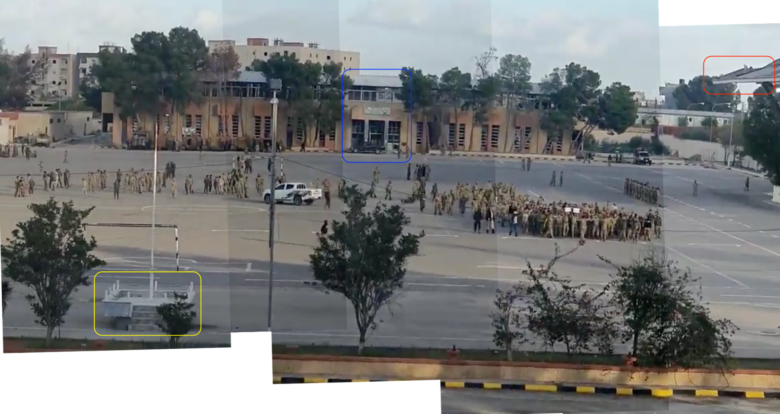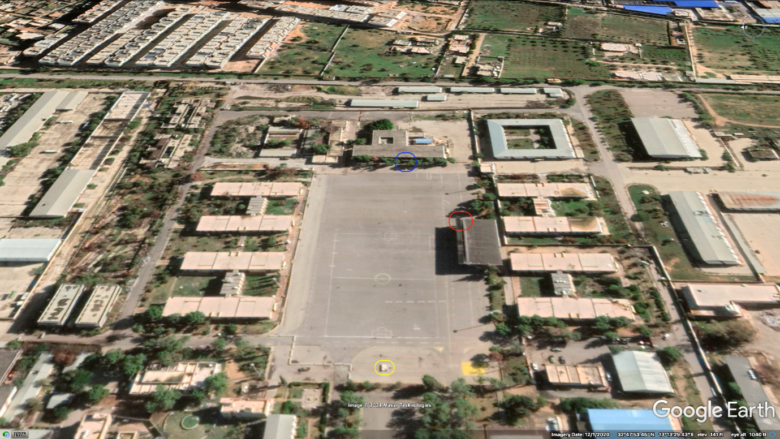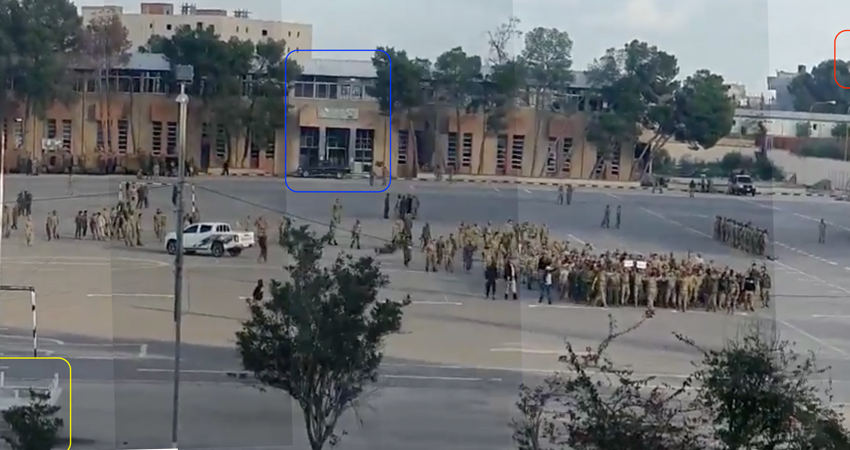Introduction
Commanders of the Syrian National Army (SNA)—backed by Turkey and affiliated with the Syrian opposition—arbitrarily deprived Syrian recruits of parts of their salaries, which they are paid in return for fighting in Libya as mercenaries. Several faction commanders stole recruits’ wages, mostly those of the Hamza/Hamzat Division, the Sultan Murad Division, the Sultan Muhammad al-Fateh Brigade/Liwa Sultan Muhammad al-Fateh, the Suleiman Shah Brigade/al-Amshat, and the Mu’tasim Division. In some cases, recruits were robbed of sums of the salaries they signed up for. In other cases, recruits were paid less than their assigned salaries and in Turkish Lira (TL) instead of the US dollar (USD).
Syrians for Truth and Justice (STJ) obtained testimonies confirming that Syrian mercenaries—stationed at the Tripoli-based Salah al-Din Police Academy—held a protest against commanders, railing at the abuses they subjected them to. STJ also had access to widely circulated voice notes, in which recruits threatened to murder a number of the commanders involved in the reported fraud cases.
Eyewitnesses, interviewed by STJ, reported infighting between the SNA factions in Libya. The factions clashed over spoils, stolen goods, money transfers, and currency exchange rates. Eyewitnesses also confirmed that Syrian mercenaries were involved in hash trafficking operations as they returned from Libya to Syria.
Background
Hundreds of young SNA combatants enlisted to fight in Libya as mercenaries next to forces of the Turkey-backed Government of National Accord (GNA). These combatants were promised lucrative salaries in return for fighting against the Libyan National Army (LNA), led by retired Major General Khalifa Haftar.
Pertaining to recruitment of Syrian militants to fight in Libya as mercenaries, STJ also documented that Russia carried out similar enlistments, sending Syrians to join forces of the LNA.
The SNA factions have been transferring Syrian mercenaries to Libya since late 2019. These transfers were arranged and overseen by Turkey, which has carried out over 150 flights transporting mercenaries, weapons, and Turkish military experts. STJ published several reports tracking the transfer of mercenary fighters beginning late 2019 and most recently in March 2021.
Report Methodology
For the purposes of this brief report, STJ’s field researchers interviewed five fighters of Turkey-affiliated Syrian armed groups. The fighters, some of whom remain in Libya, were interviewed either in person or online through secure messaging applications.
STJ’s field researchers also conducted brief interviews with 10 other mercenaries, who confirmed they were robbed or misled by the commanders of the factions they joined.
-
Ripped off Mercenaries
Command-level fraud began at the outset of mercenary transfer operations to the Libyan capital Tripoli. Combatants recruited by the SNA to fight alongside the GNA were cheated of their wages by the brokers who recruited them and by commanders of SNA-linked factions they fought with in Libya. The whole time, Turkish officers, tasked with managing factions’ affairs and overseeing their performance, knew of the financial abuses committed against recruits but chose to turn a blind eye on the perpetrators.
The commanders involved adopted two fraud schemes. In some cases, they withheld shares of the recruits’ salaries, sometimes confiscating up to 30% of the assigned wages. In other cases, officers in charge of mercenary financial and administrative affairs changed the salaries’ currency and paid mercenaries in TL instead of USD, which cost the fighters major losses due to significant exchange rate discrepancies with the TL continuing to hit record lows against the USD during the months covered in the report.
Brokers, faction commanders, and leaders of sub-military groups deliberately hid the terms of contracts[1] prepared by partner Turkish security companies. The contracts, as reported by eyewitnesses in former STJ reports, stipulated the following:
“USD salaries are determined in line with each fighter’s specialty. Other contract terms outlined procedures to be followed and compensation a fighter/mercenary is to be paid in case of injury, based on the injury’s location and chronic effects, as well as the compensation a family is to be paid in case of a fighter’s death. Further details were kept from fighters. Contracts were subsequently replaced by oral agreements involving the fighter/mercenary on the one hand and the broker and faction commander on the other.”
In the section below, STJ recounts first-hand experiences of three fighters, who suffered wage thefts, contract manipulation, and negligence when wounded. The three cases confirm that factions did not keep promises they made to recruits at the early stage of the enlistment process.
Testimony 1: Tawfiq, a commander of a battalion operating under the SNA-affiliated Faylaq al-Sham (al-Sham Legion), was one of the recruits of the first batch of mercenaries transferred to Libya. He said:
“Before we were flown to Libya, we met Adib al-Ass’ad, commander of the brigade we fought for. He lured us into going to Libya, speaking of 2000 monthly USD salaries. He also told us that we will not engage in combat and that our task will be limited to providing guard services to Turkish military posts there. He said that once we have arrived at the military posts, officials in charge will take our personal information; fingerprints; and iris scans, keeping them for later use because we will be subsequently granted the Turkish citizenship and allowed into the Turkish Army. He said that our wives and children will probably be made citizens too.”
He added:
“The contract was allegedly for three to six renewable months. However, after we landed in Libya and served there, we did not receive the salaries we signed up for. We were paid 10,000 TL only; the rest was confiscated by the brigade’s commander Adib al-Assa’d—a policeman who defected from the Syrian regime and a resident of Kafr Kalbin village. He robbed us of our money. Justifying the wage theft, he said that he was the one who sent us to Libya in the first place and that he was entitled to have a part of the payment. We were also surprised that there were not such things as contracts or citizenship. We later knew that the Turkish citizenship is granted only to families of fighters who die during battles.”
He added:
“I returned to Syria having served in Libya for three months, during which me and my co-fighters were paid two months’ salaries only.”
Testimony 2: The second fighter, a recruit of the Sultan Muhammad al-Fateh Brigade/Liwa Sultan Muhammad al-Fateh, is still in Libya. He travelled to fight there within the ranks of the Sultan Murad Division. He provided the following account on the condition of his anonymity:
“When battles abated and a state of clam predominated in Libya, the commanders of the Sultan Murad Division attempted to seize the salaries of Syrian mercenaries who fought within their groups. We served for three months and received no salaries at all. We asked for 300 USD advances. They even withheld these and gave us only 100 USD each. The involved commanders are Sami Abu Abdo, second-in- command after Fahim al-Issa, and commander Hamido al-Jhaishi.”
Testimony 3: Zakaray, a fighter of the Hamza/Hamzat Division, told STJ’s field researcher the following:
“I arrived in Libya with a military group led by a commander called Abu Arab. I engaged in several military operations launched by the GNA across the capital Tripoli and Tarhunah town. I was also there at the first attempt to take over the al-Watiya Air Base. However, I was seriously injured by shrapnel from a mortar shell before we managed to control the air base. Shrapnel hit my legs and caused me a temporary disability.”
He added:
“I spent four months in Libya. But I was paid three months’ salaries only, 1,150 USD per month. I was deported to Syria due to the injury because there were neither advanced medical centers, nor devices, to treat my case. The faction was supposed to keep paying my salary until I am fully recovered. In Syria, I could not move for six months due to my critical case, but the faction did not provide me with any assistance. The faction neglected me, even though I sent the Hamza/Hamzat Division’s command periodical medical reports to keep my salary going, but to no avail. I was informed that Abu Arab, commander of the group I fought for in Libya, was receiving and keeping my salaries to himself.”
2. Anger and Resentment Overcome Mercenaries in Libya
SNA commanders’ fraudulent practices sparked anger and resentment among Syrian mercenaries, who were deprived of all or parts of their pays. On 2 January 2021, activists circulated a video, claiming it was filmed inside the Salah al-Din Police Academy/al-Tekbali Military Camp in Tripoli city of the enraged fighters of the Hamza/Hamzat Division, operated by a person called Sayif Abu Baker. The protesting fighters demanded that they be paid the salaries the division’s commander had been withholding for five months.

Image 1- Screenshots taken from the viral video that followed protests held by fighters of the Hamza/Hamzat Division at the Salah al-Din Police Academy/al-Tekbali Military Camp in Tripoli, Libya.

Image 2- STJ managed to establish a link between several objects, marked in yellow, blue, and red in this photo and the one above, with locations in said camp, as to confirm that the circulated video indeed was filmed in the same camp.
STJ’s field researcher also gained access to voice notes, reportedly recorded by a commander of the Sultan Murad Division, Hussain Hayany. In them, Hayany threatens to kill the division’s military officer Muhammad Brimo, known as Abu Yousef, once he returns to Syria for stealing fighters’ allocations and confiscating large sums of their salaries, especially compared to other SNA-affiliated groups operating in Libya which withheld smaller salary shares.
A combatant of the Sultan Muhammad al-Fateh Brigade/Liwa Sultan Muhammad al-Fateh, fighting with the Sultan Murad Division in Libya, confirmed to STJ that Syrian military factions in Libya clashed on different dates over thefts/spoils, salaries, and currency exchange rates. The fighter added that on 17 July 2020 two fighters of the Northern Hawks Brigade were killed during a clash between the brigade’s fighters themselves. The intra-factional fight erupted due to disputes over currency exchange rates.
3. Mercenaries Themselves are Perpetrating Abuses in Libya
While Syrian mercenaries were subjected to wage thefts by their commanders in Libya, the fighters committed several crimes themselves
Testimony 1: A Syrian fighter provided STJ with details on some of the crimes and violations committed by Syrian mercenaries in Libya. These abuses included thieving, confiscating houses and properties, and facilitating prostitution. The fighter provided STJ with the names of involved fighters/mercenaries, particularly those engaged in pandering. STJ refrains from publishing any of the names listed by the fighter, for field researchers could not crosscheck the information he provided with other sources. However, in the section below, STJ cites the second part of the fighter’s exact account:
“In Tripoli, Syrian recruits function either as riot police or fighters. Most of the commanders of military sub-groups, encompassing smaller numbers of fighters, are also Syrian nationals, who in turn operate under Libyan commanders, managing armed groups themselves. Thefts and banditry are widespread, to the extent that selling spoils and weapons have become a familiar scene. Any fighter can grab whatever weapon he wants and then offer it for sale, imitating the commander of the Mu’tasim Division in Libya, Abu Khalid al-Akari. The officer in charge of selling munitions is a commander of the Hamza/Hamzat Division, Alaa Junaid. Additionally, some Libyan commanders have been exploiting Syrian fighters, ordering them to storm and rob civilians’ homes, alleging that their owners are agents/traitors. Syrian fighters treat the stolen possessions as spoils, using the traitor owners’ pretext themselves.”
He added:
“Mercenaries are supposed to stay at designated camps and to refrain from mixing with civilians. Bust most mercenaries do not abide by these orders and always seek civilian areas. Dozens of fighters tested positive for COVID-19 in Misrata city, just because they maintained contact with civilians, for Misrata is classified as the epicenter of the COVID-19 pandemic in Libya.”
He added:
“The security chaos in Tripoli is worse than that in Idlib. In Tripoli also there are hardliner Islamic groups, led by Abu Imad al-Traboulisi and another person called al-Zantani. These armed groups keep attacking the Libyan forces. There is this other group, commanded by Ausama al-Hawaili. This group too carries recurrent attacks on Libyan forces.”
Testimony 2: Tawfiq, the fighter cited earlier in the report, told STJ the following:
“SNA fighters got involved in drug and hash trafficking in Libya, as well as trading in arms and ammunition. The Mu’tasim Division’s commander, Abu Khalid al-Akari, was arrested on the charge of selling weapons and materiel to other military factions. A BKC machine gun, worth between 700 and 1000 USD, was sold for 4000 USD. Moreover, hash was smuggled from Libya to Syria. The amounts were lodged inside the military backpacks handed to fighters and covered in clothes. Military backpacks do not undergo checks, neither when fighters arrive in Turkey, nor when they pass to Syrian territories. Fighters resorted to drug trafficking to compensate for the money they were robbed of and because drugs in Libya are cheaper than in Syria.”
4. Re-purposed Recruitments
The two parties to the Libyan conflict reached an agreement on the country’s future and formed a presidential council and an interim government. On 23 January, the council demanded the departure of all foreign forces from Libya by mid-February 2021 at the latest. However, there has been no indication that Syrian mercenaries will be evacuated from Libya. In fact, despite the demand, recruitment drives for mercenaries in Syria continue.
STJ’s field researchers monitored new recruitment campaigns, seeking to enlist greater batches of Syrian mercenaries to fight in Libya. Brokers are carrying out the new recruitments as they previously have; however, they are now offering supposedly more serious promises. Brokers are showing recruits that they are strict about the salary, which amounts to a monthly 1,400 USD, adding that salaries will be paid in USD without delay or deduction. Military factions commanders and brokers in Syria are attempting to claim the trust of new recruits, for many young men are reluctant to travel to Libya having heard of the fraudulent practices their counterparts were subjected to.
____
[1] Eyewitnesses interviewed by STJ said that only the first batches of fighters signed contracts. Fighters of the remaining batches were recruited according to oral agreements, once their enlistment was approved by Turkish intelligence services.

